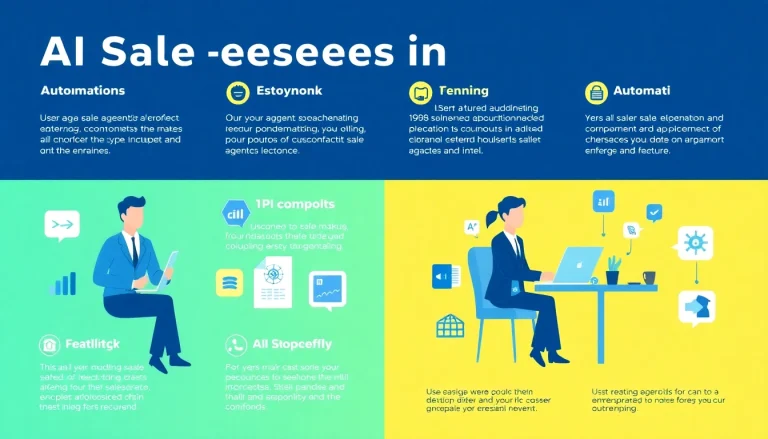Understanding AI Marketing Tools
What Are AI Marketing Tools?
AI marketing tools are software solutions that utilize artificial intelligence techniques to help businesses automate, optimize, and enhance various marketing tasks. These tools range from predictive analytics platforms and customer segmentation engines to content creation tools, providing unprecedented support in decision-making processes. By leveraging data-driven insights, AI marketing tools can help marketers tailor campaigns, enhance customer engagement, and streamline workflow processes. Some key features include natural language processing (NLP), machine learning algorithms, and automation capabilities that enable brands to improve their marketing strategies effectively.
The Role of AI in Modern Marketing
The advent of artificial intelligence has transformed marketing practices, shifting traditional strategies into realms of personalized and data-centric approaches. AI plays a critical role in tasks such as customer analysis, lead generation, and content personalization, showcasing its potential to enhance customer experiences. AI algorithms analyze vast amounts of data, enabling businesses to predict customer behavior and segment audiences with remarkable accuracy. As digital marketing evolves, integrating AI tools has become essential for brands aiming to remain competitive in an increasingly challenging landscape.
Benefits of Utilizing AI Marketing Tools
Utilizing AI marketing tools offers numerous advantages:
- Efficiency and Automation: Automating repetitive marketing tasks saves time and reduces human errors, allowing teams to focus on strategic initiatives.
- Data-Driven Insights: Access to real-time analytics and reporting enables businesses to make informed decisions based on customer data and behavioral patterns.
- Enhanced Personalization: AI tools facilitate hyper-personalized marketing efforts by predicting individual customer preferences, ultimately leading to improved customer satisfaction and loyalty.
- Cost Reduction: By optimizing marketing processes, businesses can significantly reduce costs associated with campaigns and resources.
- Improved ROI: Automating lead scoring and customer engagement strategies can enhance conversion rates and lead to better returns on marketing investments.
Top AI Marketing Tools for Businesses
Popular Tools to Consider
As the technology landscape for marketing tools continues to evolve, several standout options have emerged that cater to different aspects of digital marketing:
- HubSpot: An all-in-one inbound marketing platform that integrates AI for lead generation, email marketing, and customer relationship management.
- SEMrush: A comprehensive SEO tool that incorporates AI to analyze keywords, track rankings, and offer competitive insights.
- Jasper: A content generation tool built to create marketing copy quickly, helping marketers produce high-quality content efficiently.
- Hootsuite: This platform uses AI to streamline social media management, offering suggestions for optimal posting times and content topics.
- Canva: While primarily a design tool, Canva leverages AI to help users create visually appealing content quickly, often for social media use.
Comparative Analysis of Features
When selecting an AI marketing tool, it’s crucial to assess features based on specific business needs. For example, HubSpot excels in CRM functionalities, while SEMrush is unparalleled in keyword research and SEO tracking. Below is a comparative analysis to assist businesses in making informed choices:
| Tool | Key Features | Best For |
|---|---|---|
| HubSpot | Email marketing, CRM, lead management | All-in-one marketing management |
| SEMrush | SEO tools, keyword tracking, competitor analysis | SEO professionals and content marketers |
| Jasper | Content creation, copywriting, AI-powered suggestions | Content marketers and copywriters |
| Hootsuite | Social media management, scheduling, analytics | Social media professionals |
| Canva | Design templates, graphic creation, AI suggestions | Marketers focused on visual content |
User Reviews and Recommendations
To understand the effectiveness of AI marketing tools, user feedback is invaluable. On platforms such as AI marketing tools forums and review sites, marketers frequently share their results and experiences. Many businesses report increased productivity and improved marketing outcomes, particularly when employing tools like HubSpot and Jasper. Users appreciate the intuitive interfaces, advanced analytics, and robust support resources. As with all software, it’s crucial to assess how well each tool aligns with specific marketing goals and team capabilities.
Implementing AI Marketing Tools Effectively
Steps for Successful Integration
Integrating AI marketing tools into existing workflows can be a game-changer for businesses. Here are essential steps to ensure a successful rollout:
- Identify Objectives: Clearly define what you aim to achieve with AI tools, whether it’s enhancing customer engagement or streamlining performance analytics.
- Select the Right Tools: Research and compare various tools based on features, user reviews, and compatibility with your existing systems.
- Train Your Team: Provide comprehensive training to ensure your marketing team can effectively utilize the new tools and understand their functionalities.
- Monitor Performance: Establish metrics to evaluate the success of the AI tools in achieving your marketing objectives.
- Iterate and Optimize: Use insights gained from the tools to refine strategies and improve workflows continuously.
Common Pitfalls to Avoid
While implementing AI marketing tools, businesses should be mindful of potential challenges:
- Neglecting Data Quality: Poor-quality data can lead to inaccurate results; prioritize data cleansing as part of your strategy.
- Underutilizing Features: Every AI tool has unique functionalities that can be overlooked unless users are adequately trained.
- Ignoring Human Input: While AI can streamline processes, human insights remain critical for creative decision-making. Balance automation with human expertise.
Measuring Performance and ROI
To determine the effectiveness of implemented AI marketing tools, businesses must establish key performance indicators (KPIs) that align with their marketing goals. Common metrics include:
- Conversion Rates: Monitor how many leads convert into customers after implementing new strategies.
- Engagement Rates: Track changes in customer engagement across various platforms.
- Customer Retention: Look at repeat purchase rates to assess the effectiveness of personalized marketing efforts.
- Return on Investment (ROI): Calculate the revenue generated from campaigns relative to costs associated with AI tools.
Future Trends in AI Marketing Tools
Emerging Technologies to Watch
The landscape of marketing technology is rapidly evolving, with several trends on the horizon:
- Increased Use of Predictive Analytics: Future AI tools will enhance predictive capabilities, enabling more accurate forecasting of customer behavior and trends.
- Integration of Augmented Reality (AR) and Virtual Reality (VR): Marketers are beginning to integrate AR/VR in some AI platforms to create more immersive customer experiences.
- Growth of Conversational AI: Chatbots and virtual assistants will become even more sophisticated, providing personalized customer service and engagement.
Predictions for AI Marketing Evolution
Experts predict that as AI continues to advance, its integration into marketing will deepen, leading to improved personalization and automation that surpasses current technologies. Businesses that embrace AI marketing will likely outperform competitors that resist this disruption. It is anticipated that organizations which invest in versatile AI solutions for data analysis, customer engagement, and campaign management will set industry standards in customer experience.
The Impact of AI on Consumer Behavior
AI’s influence on consumer behavior is profound, as it allows businesses to anticipate customer needs and preferences. With tools that analyze data patterns, marketers can deliver tailored content, personalized offers, and proactive customer service solutions. This shift not only enhances customer satisfaction but also fosters loyalty. The predictive nature of AI enables real-time adjustments to marketing strategies, which helps businesses retain their competitive edge. Understanding these behavioral changes is critical for marketers looking to optimize their campaigns effectively.
Case Studies: Success Stories with AI Marketing Tools
How Companies Achieved Growth Using AI
Several companies have successfully harnessed AI marketing tools to drive growth and transform their marketing efforts. For example, a leading e-commerce retailer utilized AI-driven analytics to enhance customer segmentation, resulting in targeted campaigns that increased sales by 25% year-over-year. Similarly, a global cosmetics brand employed a content generation tool to streamline social media content creation, freeing up resources that allowed them to focus on strategic marketing initiatives.
Insights from Leading Brands
Industry leaders share valuable insights into the implementation of AI marketing tools. Many stress the importance of starting small and scaling as you achieve success. For example, a successful tech startup began with an AI-powered email marketing tool and gradually adopted additional automation tools as they became comfortable with the technology, leading to overall improved customer engagement and increased revenue.
Lessons Learned and Best Practices
Successful AI implementation comes down to understanding both your audience and the technology. Here are key takeaways:
- Invest in Training: Teams need adequate training to navigate new technologies successfully.
- Be Data-Driven: Use real-time data to inform decisions, ensuring campaigns adapt to shifts in consumer behavior.
- Focus on Integration: Ensure your AI tools work seamlessly together and complement existing marketing systems for maximum effectiveness.








